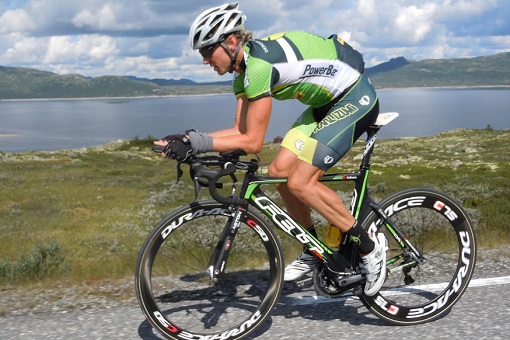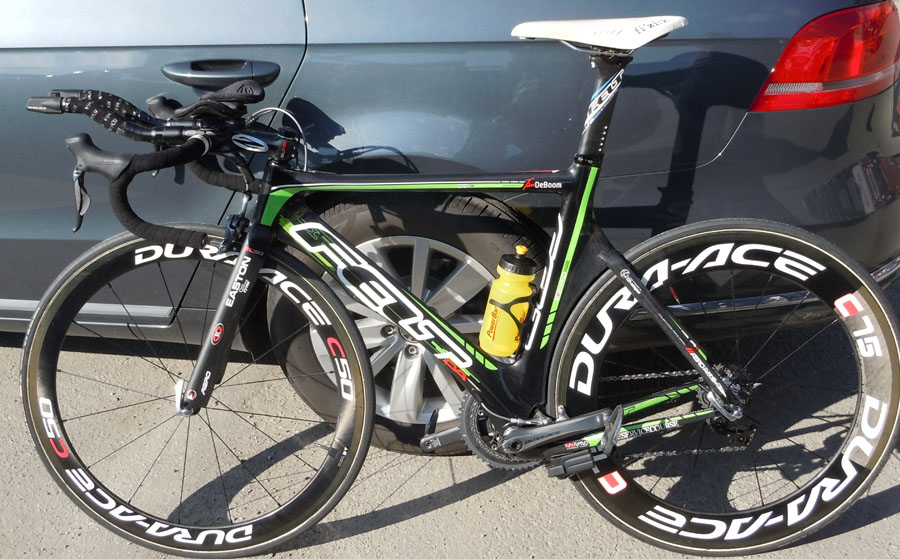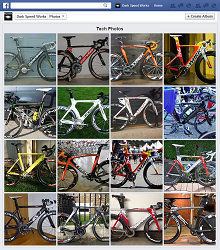

 For many people considering
their first bike purchase after they have decided to get involved in
triathlon, there is often a dilemma: what kind of bike to get when
you're starting out? Should you get a road bike with traditional frame
geometry and road drop bars? Or, instead should you get a complete tri
bike with a steeper seat tube angle and aero frame and full aerobar
set-up? Or, is there another good option? (Hint: YES, there is.)
For many people considering
their first bike purchase after they have decided to get involved in
triathlon, there is often a dilemma: what kind of bike to get when
you're starting out? Should you get a road bike with traditional frame
geometry and road drop bars? Or, instead should you get a complete tri
bike with a steeper seat tube angle and aero frame and full aerobar
set-up? Or, is there another good option? (Hint: YES, there is.)
Each type of bike has distinct
advantages. The traditional road bike has the brakes and shifters in
easy reach; the drop bars have lots of hand positions available; a road
bike is typically more welcome at group rides; a road bike allows for
faster (and safer) descending and cornering; and it's far more versatile
for utility riding like riding in traffic, trips to the store,
commuting, etc. But a tri bike has its own set of advantages. A bike
dedicated for triathlon is often faster and the frame is significantly
more aerodynamic (both pretty important qualities for a tri race bike);
a tri bike usually allows the rider to get into a better position for
generating good power while in the aero position; and a triathlon bike
is often more comfortable for riding on the aerobars (if fit correctly,
of course), etc.
Most new triathletes end up choosing
one or the other. A common pattern for many new triathletes is to start
with a standard drop-bar road bike and then they add clip-ons to make
the bike more suitable for triathlon racing and training. A few seasons
later, the athlete returns to their bike shop and then buys a second
bike, a triathlon bike with tri-specific geometry and a full aerobar set
up. Sometimes the athlete sells their used road bike and use only their
newly-acquired tri bike, and sometimes the athlete ends up with two
bikes. There is nothing inherently wrong with this pattern if it fits in
one's budget and is compatible with your desires.
The Third Option

But there's also a third option that can give new athletes the best of
both worlds and might even end up saving them considerable money, and
from buying more bikes than they want. That option is a tri bike, but
one fitted with road drop bars and a set of well-designed clip-on
aerobars. In many ways, this creates a true multisport (and
multi-course) bike because it makes for an aero tri bike that is equally
fast on super fast descents, steep climbs, rolling hills and
pancake-flat race courses. The tri bike with drop bar option can give a
new athlete essentially all of the advantages of both bikes, but all in
just one machine. The drop bars (with clip-on aerobars) do give one a
slight aero penalty vs a similar full aerobar set up, but the aero
penalty is fairly small, a few seconds per 40k (depending on your
cycling speed).
In addition to being low-cost on the onset, this third option also gives
a new triathlete lots more options as they progress in skill and
experience. For example, over time, one can (1) keep the drop bars and
clip-ons on the triathlon bike and just use it that way for training and
multisport racing. Or (2), one can keep the drop bars on the bike, take
off the clip-on bars, and use it for road riding if the rider's
triathlon passion morphs into a bike racing or grand fondo passion
(because 95% of tri frames, with a few small position tweaks, can--and
do--function perfectly well as road frames). Or (3), one can switch out
the drop bars and clip-ons for a set of full aerobars if the athlete
wants to fully maximize all his/her aero advantages on super flat
courses.
So, assuming that you have an off-the-shelf triathlon bike, what do you
need to make this fairly easy conversion? Well, you will need a set of
drop handlebars with the proper length stem. (Sometimes you can use your
old stem, but it depends on how you will position your seat on the
seatpost rails, and on the geometry of your bike, and on your preferred
position. We recommend that you position your saddle, not at the extreme
aft or extreme forward range of your adjustment, instead position the
saddle toward the middle of your saddle fore-aft range adjustment. This
way you will be able to take advantage of the more forward seat tube
geometry of your triathlon bike.) And you will need a set of STI-type
shifters (dual control drop bar levers that combine braking and
shifting) that are compatible with your drivetrain. Finally, depending
on how your bike was set up initially, might need a set of brake cables
and shift cables (and maybe housing). But often, drop bars will not make
big changes in the distance to your shifters and brake levers, and you
might be able to re-use your existing cables and housing, but they might
need some trimming. So, to summarize, you will need:

- Likely a stem of the proper length
- A set of drop bars compatible with your stem and some handlebar tape
- A set of STI-type dual control shift/brake levers compatible with your drivetrain
- (Possibly) a set of brake and shift cables
- (If desired) a set of clip-on aerobars compatible with your drop bars
For an interesting example of such a set up, below is a photo of a Felt
DA tri bike set up exactly this way for a triathlon with considerable
climbing and descending. This bike belonged to former pro and 2-time IM
Kona winner Tim DeBoom. One nice thing on this machine, DeBoom had his
shimano electronic shifting controls set up to allow shifting from both
the brake hoods and from the ends of the aerobars.

In the end, there is no one right way to
select your first triathlon bike. We suggest you learn as much
as you can, and then try out and consider every good option. Then make the
best choice for your budget, for your lifestyle, and for your goals.
Happy riding,
The DSW Team
Have a question or a comment?
Click to send us an email

Back to blog landing page



